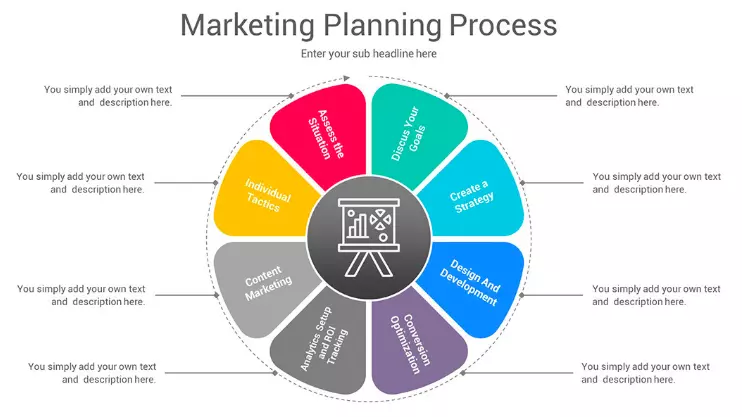Marketing Planning
Definition
Marketing planning is the process of creating a roadmap for achieving marketing goals and objectives through the use of various marketing strategies and tactics.
Description
Marketing planning is necessary for businesses to achieve their goals and objectives by creating a roadmap for implementing effective marketing strategies and tactics. It helps businesses to analyse the market, identify the target audience, allocate resources efficiently, and evaluate the success of their marketing campaigns.

Importance of Marketing Planning
Marketing planning is essential for businesses of all sizes and industries. Here are some reasons why marketing planning is essential:
- Sets clear goals and objectives: Marketing planning helps businesses to set clear and measurable goals and objectives. This provides direction and focuses for the marketing activities and ensures that efforts are aligned with overall business objectives.
- Identifies target audience: Marketing planning helps businesses to identify and understand their target audience. This allows them to tailor their marketing strategies and tactics to the audience’s specific needs and preferences, improving the marketing campaign’s effectiveness.
- Allocates resources efficiently: Marketing planning helps businesses to allocate their resources, including time, money, and personnel, efficiently. This ensures that resources are used effectively and efficiently to achieve marketing goals and objectives.
- Improves decision-making: Marketing planning provides businesses with a better understanding of the market and competitor activity. This allows them to make informed decisions about marketing strategies and tactics, increasing their chances of success.
- Facilitates evaluation and improvement: Marketing planning helps businesses evaluate their marketing campaigns’ success. This allows them to identify areas for improvement and make changes to future campaigns to improve their effectiveness.
Steps to follow for Marketing Planning
Let us read the steps in marketing planning:

- The first step in marketing planning is market analysis. This involves researching the market to identify trends, consumer behaviour, and competitor activity. This information is used to better understand the target audience, their needs and preferences, and the overall market landscape.
- The next step is to identify the target audience. This involves defining the demographics, psychographics, and behaviour of the audience that the marketing campaign is aimed at. Understanding the target audience is crucial for developing marketing strategies that resonate with them.
- Once the target audience has been identified, the marketing strategies can be developed. This involves deciding on the marketing mix, which includes product, price, promotion, and place. The marketing mix is tailored to the target audience and designed to achieve the marketing goals and objectives.
- After the marketing strategies have been developed, a budget can be created. This involves estimating the costs associated with the marketing campaign and allocating resources accordingly. The budget is an important part of marketing planning, ensuring that the campaign is financially viable and that resources are used efficiently.
- Once the budget has been finalised, the marketing campaign can be implemented. This involves creating and executing marketing strategies, including advertising, public relations, social media, and other promotional activities. It is important to monitor the campaign’s performance and make adjustments as needed to ensure that it achieves the desired results.
- Finally, the marketing campaign should be evaluated to determine its success. This involves analysing and comparing the campaign results to the marketing goals and objectives. If the campaign is successful, the strategies and tactics used can be replicated in future campaigns. Conversely, if the campaign is not successful, adjustments can be made to improve future campaigns.
Tools for Marketing Planning
There are various tools that businesses can use for marketing planning. Here are some examples:
- SWOT analysis: SWOT analysis is a strategic planning tool that helps businesses to identify their Strengths, Weaknesses, Opportunities, and Threats. This analysis can be used to inform marketing strategies and tactics.
- Market research: Market research involves gathering and analysing data about the market, including consumer behaviour, trends, and competitor activity. This information can be used to develop effective marketing strategies and tactics.
- Customer persona development: Developing customer personas involves creating ideal customer profiles based on demographics, psychographics, and behaviour. This information can be used to tailor marketing strategies and tactics to the specific needs and preferences of the target audience.
- Marketing mix: The marketing mix includes product, price, promotion, and place. It is a tool that businesses can use to develop a comprehensive marketing strategy that considers all aspects of the marketing campaign.
- Budgeting tools: Budgeting tools, such as spreadsheets or software, can estimate the costs associated with the marketing campaign and allocate resources efficiently.
- Marketing automation: Marketing automation tools can automate various marketing tasks, such as email campaigns, social media posting, and lead generation. This can save time and improve the efficiency of the marketing campaign.
- Metrics and analytics: Metrics and analytics tools can be used to track the marketing campaign’s performance and evaluate its effectiveness. This information can be used to make adjustments and improvements to future campaigns.
Example:
One example of a brand that has implemented effective marketing planning is Coca-Cola. As a result, Coca-Cola’s long history of successful marketing campaigns has consistently remained one of the world’s most valuable brands.
One of the critical aspects of Coca-Cola’s marketing planning is its focus on understanding and connecting with its target audience. Through extensive market research and customer profiling, Coca-Cola has identified its target audience as young people aged 18-34 looking for refreshing and fun experiences.
Based on this understanding, Coca-Cola has developed a comprehensive marketing mix that includes a variety of advertising campaigns, sponsorships, and promotions that appeal to this target audience. For example, Coca-Cola’s “Share a Coke” campaign encouraged customers to purchase personalised bottles of Coca-Cola with their own names or the names of their friends, which created a sense of personalization and social sharing.
Coca-Cola also uses social media and digital marketing to connect with its audience and create engaging content that aligns with its brand values. For example, the company’s “Taste the Feeling” campaign features emotionally-driven advertisements focusing on the experience and enjoyment of drinking Coca-Cola rather than the product itself.
FAQs
What is marketing planning?
Marketing planning is developing a structured approach for implementing effective marketing strategies and tactics to help businesses achieve their goals and objectives.
Why is marketing planning important?
Marketing planning is important because it helps businesses set clear goals and objectives, identify the target audience, allocate resources efficiently, improve decision-making, and facilitate evaluation and improvement of marketing campaigns.
What are the critical components of marketing planning?
The critical components of marketing planning include market research, customer analysis, target audience identification, marketing mix development, budgeting, and evaluation and measurement.
How can businesses use marketing planning to improve their ROI?
Businesses can use it to improve their ROI by focusing on the most effective marketing strategies and tactics aligned with their goals and objectives and operating metrics and analytics to track the performance of their campaigns and make adjustments accordingly.
How often should businesses update their marketing plans?
Marketing plans should be updated regularly to ensure they remain relevant and practical. The frequency of updates will depend on the industry, market conditions, and business goals and objectives.
What are some common challenges in marketing planning?
Some common challenges include a need for more resources, insufficient data, changing market conditions, and difficulty accurately predicting consumer behaviour.
How can businesses overcome these challenges in marketing planning?
Businesses can overcome these challenges by investing in market research, prioritising and allocating resources effectively, using predictive analytics to forecast consumer behaviour, and remaining flexible and adaptable in response to changing market conditions.





We would love to have your opinion.